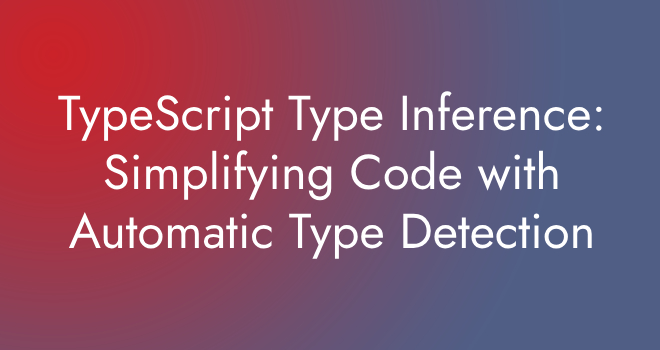Type inference in TypeScript is a feature that allows the TypeScript compiler to automatically determine the data type of a variable or expression based on its value. This helps in writing more concise and maintainable code by reducing the need for explicit type annotations. Here’s an example of type inference in TypeScript:
TypeScript can infer types when no annotation is provided during:
- Variable initialization.
- Member initialization.
- Setting defaults for parameters.
- Function return type.
Type Inference in Variables:
When you initialize a variable without specifying its type, TypeScript uses the assigned value to infer the variable’s type. Here’s an example:
let x = 'x'; // TypeScript infers the type of 'x' as stringIn this case, TypeScript infers that x is of type string because it’s initialized with a string value ‘x’.
Member Initialization:
TypeScript also infers types for object properties or class members when they are initialized without explicit type annotations. Consider this example:
class Person {
name = 'John'; // TypeScript infers the type of 'name' as string
age = 30; // TypeScript infers the type of 'age' as number
}Here, TypeScript infers that the name property is of type string and the age property is of type number based on their assigned values.
Setting Defaults for Parameters:
In TypeScript, function parameters can have default values, and the compiler uses these default values to infer parameter types. For instance:
function greet(message = 'Hello, World!') {
console.log(message);
}In this example, TypeScript infers that the message parameter has a default value of type string (‘Hello, World!’).
Function Return Type:
TypeScript can also infer the return type of a function based on the types of expressions within the function’s body. Here’s an example:
function add(a: number, b: number) {
return a + b; // TypeScript infers the return type as number
}In this case, TypeScript infers that the add function returns a value of type number because it adds two numbers together.
In summary, TypeScript’s type inference is a feature that allows you to write cleaner and more concise code by reducing the need for explicit type annotations. It analyzes the values and expressions used in your code to determine their types, making your code more readable and maintainable while still ensuring type safety. However, you can always provide explicit type annotations when you want to be more specific or when TypeScript’s inference may not be accurate enough for your needs.

